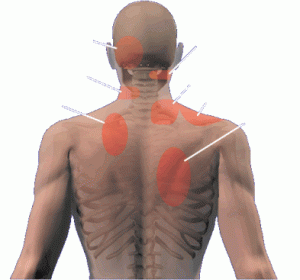Whiplash: When to See a Doctor
 Whiplash is the set of injuries that occur to the soft tissue areas of the neck when it’s suddenly propelled or distorted. It typically affects the muscles, tendons, and ligaments of the neck, and in some instances can cause severe problems. The cervical spine is located in the neck and shoulder region and serves to support the head, which allows the neck to function properly. When whiplash occurs, the soft tissues of the cervical spine are thrown out of proportion, causing the head and neck to thrust forward, and then snapping back into place. In car accidents for example, the seat belt causes whiplash by safely restraining the body as the car is jerking, but leaving the head unsecured. Often times on roller coasters, riders will experience whiplash as result of the head being loosely thrust around while the body is strapped into place.
Whiplash is the set of injuries that occur to the soft tissue areas of the neck when it’s suddenly propelled or distorted. It typically affects the muscles, tendons, and ligaments of the neck, and in some instances can cause severe problems. The cervical spine is located in the neck and shoulder region and serves to support the head, which allows the neck to function properly. When whiplash occurs, the soft tissues of the cervical spine are thrown out of proportion, causing the head and neck to thrust forward, and then snapping back into place. In car accidents for example, the seat belt causes whiplash by safely restraining the body as the car is jerking, but leaving the head unsecured. Often times on roller coasters, riders will experience whiplash as result of the head being loosely thrust around while the body is strapped into place.
Symptoms of whiplash usually include, but are not limited to: pain or stiffness in the neck, pain or discomfort in the chest, shoulders, head, and arms, cervicogenic or neck-related headaches, and lower back pain. Whiplash can typically be cured with outpatient and over the counter treatment, but in more serious cases it may be necessary to see a spine specialist. If you have experienced whiplash, consult your health care professional for a physical to check the severity of the injury. If your whiplash symptoms are moderate, there are a number of stretching and strength training exercises that are available to you, as well as pain medication and muscle relaxers. For more severe symptoms contact your doctor if:
1) You experience numbness or tingling in your arms or legs– this numbness or heaviness is often associated with herniated discs which may be caused by whiplash.
2) Your neck pain is severe and debilitating– while whiplash symptoms typically heal on their own, extreme loss of motion and function in the neck and shoulders region may point to a more serious condition.
3) You experience memory loss or a loss of consciousness– Any strain to the neck or spinal base can seriously affect the brain stem and cause serious motor function issues.
4) You experience nausea, confusion, dizziness, or fatigue– although whiplash is often associated with car accidents and roller coaster, neck strains and injuries from physical activities such as sports may also lead to concussions.
Taking your spinal health seriously is not limited to caring for your back and lower spine. The neck serves as a base structure for your head and brain, and it deserves the same amount of attention and protection as your spine. Using headrests in cars and wearing proper braces and padding when playing contact sports can greatly reduce your risk of whiplash injuries. Do not hesitate to seek medical attention for any of the symptoms listed above- it’s better to catch these issues before they grow into a major problem!

Categories
Archives
Contact Dr. Mudit Sharma
Phone: (571) 921-4877
Toll Free: (855) 774-6334
Monday – Thursday: 8am – 4pm
Friday: 8am – 2pm
Fredericksburg
4604 Spotsylvania Parkway, Suite 300 Fredericksburg, VA 22408
Manassas
8650 Sudley Road, Suite 315
Manassas, VA 20110-4418
